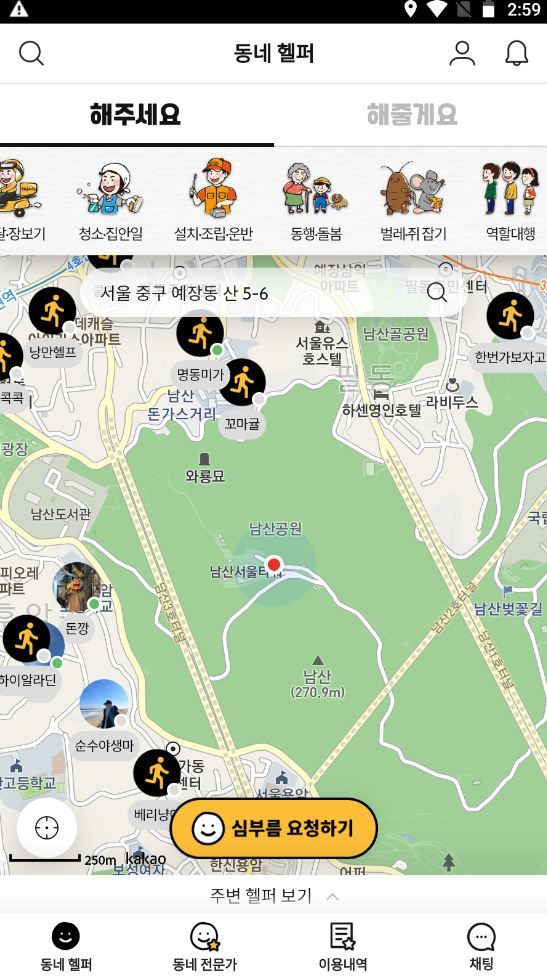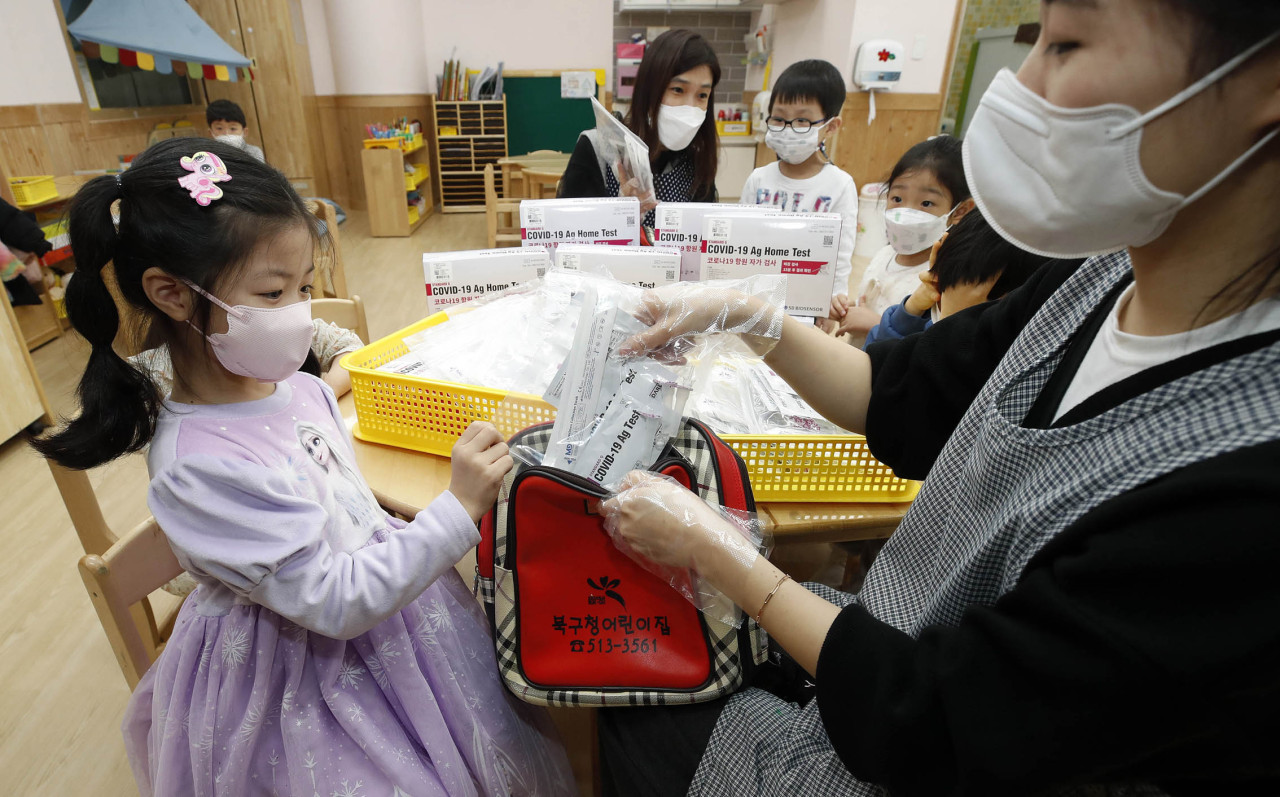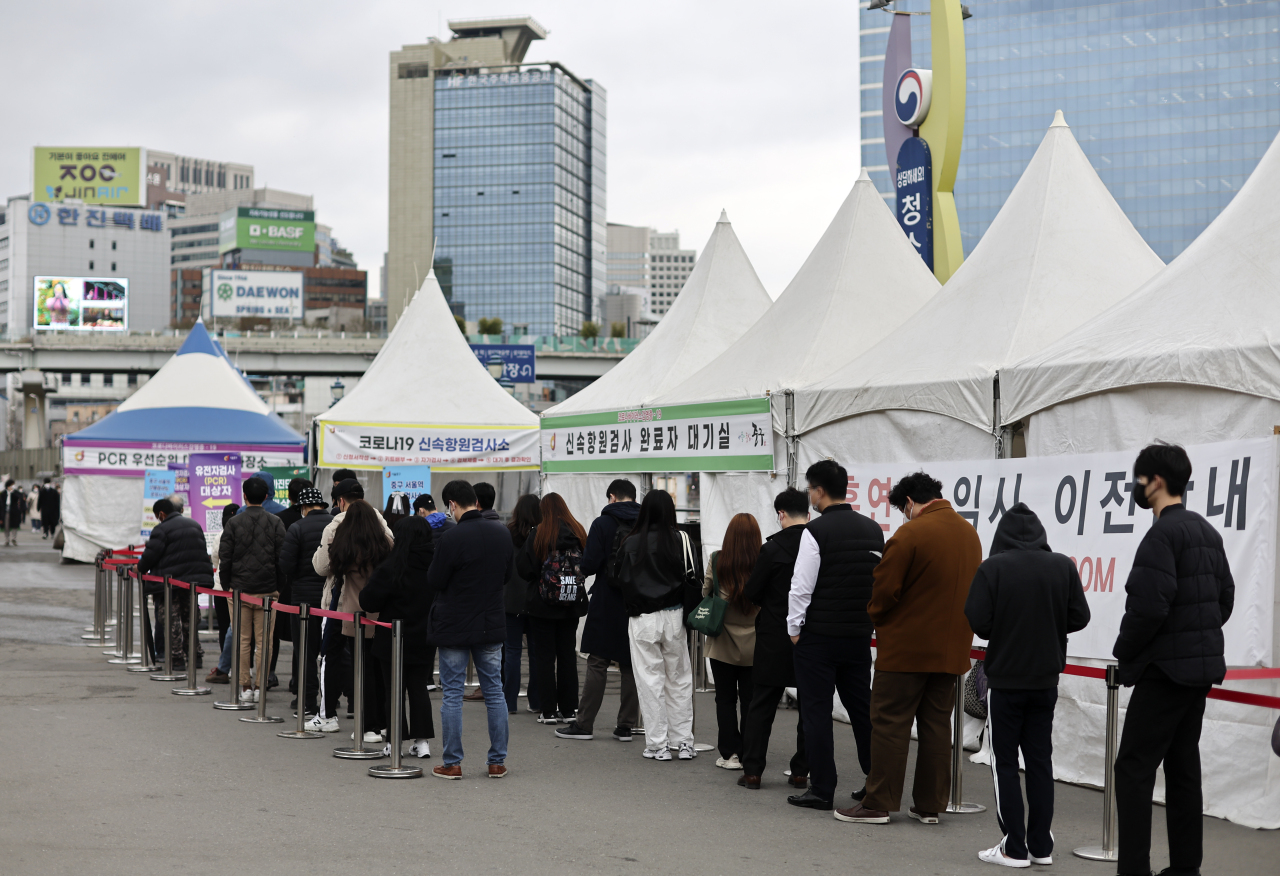‘Errand’ apps, fledgling business born out of pandemic
Do-everything services gain popularity amid concerns about security and working conditions
By Yoon Min-sikPublished : March 31, 2022 - 19:21
When 34-year-old Lee Min-ho tested positive for COVID-19, the most immediate concern for his young family was getting food and supplies. Instead of calling up his parents, Lee opted to use what is called an “errand app” on his phone.
“I just needed a few items from the local store, and I didn’t want to bother other people. So I requested (an errand runner) to pick up the groceries and leave them at my doorstep,” he said.
In the era of social distancing, mobile applications that take care of everyday chores is a rapidly growing industry in Korea. The so-called errand apps, operated mostly by start-up companies, have registered record numbers in sales in the past two years of the coronavirus pandemic.
The annual revenue for “Anyman” jumped from 1.4 billion won ($1.16 million) to 2.4 billion in 2020 and 2.6 billion last year. “Hae-ju-sae-yo (Please Help)” currently has 250,000 monthly users and was downloaded 650,000 times, and said its March revenue has doubled compared to February.
These mobile applications are diminutive in size compared to food delivery app behemoths like Baemin, Yogiyo and Coupang Eats, but what sets them apart is their range of services.
A pandemic-friendly business
Their services range from food delivery to grocery shopping, cleaning homes, house chores, installment and/or assembly of household appliances, childcare, senior care, tutoring, pest/rodent control, and even “proxy services,” which means carrying out specific roles designated by the client. One such case recently covered by local media was a 47-year-old man living alone requesting for a person to accompany him to the hospital for his endoscopy.
“I just needed a few items from the local store, and I didn’t want to bother other people. So I requested (an errand runner) to pick up the groceries and leave them at my doorstep,” he said.
In the era of social distancing, mobile applications that take care of everyday chores is a rapidly growing industry in Korea. The so-called errand apps, operated mostly by start-up companies, have registered record numbers in sales in the past two years of the coronavirus pandemic.
The annual revenue for “Anyman” jumped from 1.4 billion won ($1.16 million) to 2.4 billion in 2020 and 2.6 billion last year. “Hae-ju-sae-yo (Please Help)” currently has 250,000 monthly users and was downloaded 650,000 times, and said its March revenue has doubled compared to February.
These mobile applications are diminutive in size compared to food delivery app behemoths like Baemin, Yogiyo and Coupang Eats, but what sets them apart is their range of services.
A pandemic-friendly business
Their services range from food delivery to grocery shopping, cleaning homes, house chores, installment and/or assembly of household appliances, childcare, senior care, tutoring, pest/rodent control, and even “proxy services,” which means carrying out specific roles designated by the client. One such case recently covered by local media was a 47-year-old man living alone requesting for a person to accompany him to the hospital for his endoscopy.

Many of these errand apps existed before the pandemic, but the mandatory quarantine programs for COVID-19 containment have reshaped how people utilize these apps.
As of now, these services are a go-to solution for COVID-19 patients who are not allowed to step outside their place of quarantine.
Medicine delivery accounts for 30 percent of the services provided by Hae-ju-sae-yo, 60 percent of which were requests to deliver at-home testing kits for the COVID-19. Cho Hyeon-yeong, the CEO of Hae-ju-sae-yo, said that “standing in line for COVID testing booths” and “picking up medicine from hospital after remote checkup” are new forms of service that were created during the pandemic.
Those wishing to use the app can install it on their phones, and click on the “helpers” closest to their location. Upon clicking request, one can check the helpers’ field of expertise and input the type of service one wishes to request, location, form of payment, requested time for service, and the service fee.
Most are part-time helpers. Students, housewives and even some office workers – who make up 6 percent for Hae-ju-sae-yo -- registered on the application to earn some money on the side. The company said the highest-earning helper makes 6 million won a month.


Concerns remain
Despite their convenience, the relatively new business accompanies risk regarding the safety of both users and helpers from potential crimes.
In August 2021, a 31-year-old man used an errand app to hire a helper. He asked the helper to check if he had turned off the air conditioner at his home, providing the address and password for the door lock. However, it was not the home of the client, but that of his former female colleague.
Seoul Seobu District Court last Wednesday fined the client 3 million won ($2,478) on grounds that having an unsuspecting person break into another person’s home by proxy is considered intrusion upon habitation, Chapter 36, Article 319 of the Criminal Act.
The incident highlighted a glaring weakness in the current system of most errand applications: it is mostly up to the helpers themselves to determine the legitimacy of the requests. In cases like the one mentioned above, it is theoretically possible to have the helper take any item from other people’s homes, as the system does not mandate the helper to validate if the place is indeed the client’s residence.
“In case of illegal requests, we do have a system that monitors all requests at all times and boot out users who make them. But there are cases that slip by, in which case helpers are to report them,” Cho said. On safety concerns involving crimes by helpers themselves, he said a GPS tracking system and the personal information of the helpers themselves work as preventive measures.
Operators of errand apps have put in measures to prevent unlawful requests, such as mandating clients to present their ID cards in order to request purchase and delivery of alcohol or cigarettes.
But again, this process is up to the helpers themselves, most of whom are freelancers who go through a simple hiring process. Potential helpers of Hae-ju-sae-yo are required to watch a five-minute video on their guidelines and how to use the application, after which they take a test on what they learned.
Another concern is that perhaps because most of these applications are budding enterprises, hardly any of them provide insurance policies for industrial accidents.
The Ministry of Employment and Labor in December announced that starting in January, platform-based workers -- referring to case-by-case workers hired by service-providing platforms -- can also be insured. Major delivery apps responded differently. Baemin and Yogiyo required all its delivery workers -- most of whom use motorcycles -- to get an insurance plan, while Coupang Eats did not mandate it.
“We don’t provide insurance (for our workers), but we do compensate for any items of clients damaged or lost by helpers. We don’t yet have plans for accidents,” said Cho.
When asked if Hae-ju-sae-yo plans to introduce insurance policies in the future, he replied, “Companies like Baemin or Coupang Eats have their workers use motorcycles for delivery, which means they are prone to accidents. But delivery is only a part of our services, and many of our workers deliver on foot. It is a bit burdensome (for the company) to (provide an insurance policy) just for helpers using motorcycles.”
By Yoon Min-sik
(minsikyoon@heraldcorp.com)



















![[Today’s K-pop] Treasure to publish magazine for debut anniversary](http://res.heraldm.com/phpwas/restmb_idxmake.php?idx=642&simg=/content/image/2024/07/26/20240726050551_0.jpg&u=)